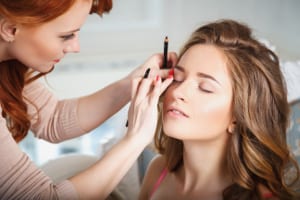 Are you a Florida makeup artist who’s been served with an Administrative Complaint or citation from the Department of Business and Professional Regulations (DBPR)? Are you worried about the future of your career as a makeup artist and confused about how to proceed? If so, you’ve come to the right place. Outlined below are the procedures for an Orlando makeup artist once a complaint has been filed, the potential penalties if convicted of wrongdoing, and a suggestion for how to avoid charges.
Are you a Florida makeup artist who’s been served with an Administrative Complaint or citation from the Department of Business and Professional Regulations (DBPR)? Are you worried about the future of your career as a makeup artist and confused about how to proceed? If so, you’ve come to the right place. Outlined below are the procedures for an Orlando makeup artist once a complaint has been filed, the potential penalties if convicted of wrongdoing, and a suggestion for how to avoid charges.
It’s important that you take this process seriously. Losing your makeup artist license can take away your ability to earn a living and provide for your family. At worst, you could face revocation of your license, a hefty fine, and a blow to your reputation. No matter how minor a complaint might seem at first, it’s vital to respond effectively. It’s critical that you take action and address the complaint or citation with experienced legal counsel as soon as possible.
The job of a makeup artist is to transform and improve a person’s face—and sometimes their body—to correct imperfections, highlight positive attributes, and remedy issues. In Florida, there are three different types of makeup artists that require licensure: cosmetologists, facial specialists, and full specialists. Each plays a slightly different but related role.
A cosmetologist provides personal care services that include tending to people’s hair, skin, and nails. Florida Statute 477.013 defines cosmetology as:
“…the mechanical or chemical treatment of the head, face, and scalp for aesthetic rather than medical purposes, including, but not limited to, hair shampooing, hair cutting, hair arranging, hair coloring, permanent waving, and hair relaxing for compensation. This term also includes performing hair removal, including wax treatments, manicures, pedicures, and skin care services.”
A facial specialist, sometimes called an esthetician, is tasked with exfoliating, waxing, lasering, moisturizing, and applying makeup to enhance a person’s appearance. The job involves assessing the condition of the patient’s skin, making recommendations on what can be done to improve skin quality, and often applying makeup.
A full specialist is tasked with all of the above, from facials and waxing to nail services and makeup application.
Makeup artists require a steady hand, an eye for detail, precision in application, and a well-developed appreciation of color, shading, and blending. Cosmetologists and full specialists must also learn the art of beautifying hair and nails, which necessitates training and expert skill. Not just anyone can become a makeup artist. It’s important that individuals interested in turning their enthusiasm and passion for makeup into a career prepare through education and training.
The Department of Business and Professional Regulations handles all licensing for those wishing to pursue a career as a cosmetologist, facial specialist, or full specialist. Licensure for all three categories require the following:
In addition, those wishing to become cosmetologists must complete a written clinical and theory test. The application fee for all applicants ranges from $60 to $75.
A licensed Florida makeup artist may be subject to a complaint that could result in disciplinary action, according to Florida Statute 477.0265. Grounds for punishment include:
The penalty for any such violation, as determined by the board, can be the following:
Anyone who wishes to file a complaint against a licensed makeup artist in Florida would
do so by contacting the DBPR and filling out a Uniform Complaint Form.
When a makeup artist receives a complaint, the DBPR opens up an investigation into the facts of the case. Information gathered during an investigation can include:
If enough evidence is gathered to proceed to the next step, the probable cause panel will review and potentially proceed with disciplinary action.
It’s highly encouraged that you partner with an experienced and skilled license defense attorney to help you develop a compelling response to the investigation procedure. A credible attorney will be able to assess your case and build you a strong defense. They may even be able to dismiss the case completely before it goes to review, which would shield you from further reputational and professional harm.
If an investigator finds enough evidence to move the case forward, it will be reviewed by a Probable Cause Panel. They will consider both the gathered evidence and the rules or regulations that have been infringed. Throughout this process, it’s crucial that you have a defense lawyer by your side and do not attempt to handle the case alone.
The panel review may lead to three possible results:
If the panel finds little or no evidence proving that you violated any rules or regulations, the case will be dismissed. If you’re issued a letter of guidance, you won’t face any disciplinary action, but your reputation is at stake. If a formal Administrative Complaint is issued against you—the most severe possible outcome—the process will proceed to the next step.
At this point in the process, the complaint has become public record, and even if your case is eventually dismissed, your reputation may be affected. The complaint will outline the specific laws or regulations that you’re accused of violating as well as the statements and evidence used against you during the investigation. A credible attorney will then help you decide whether to pursue a Formal Hearing or Informal Hearing.
If you choose to proceed with an Informal Hearing, you do not wish to disagree with any of the allegations against you, nor do you want to disclose any new evidence. Instead, you plan to acknowledge the complaints and face the board, who will make a final decision on what penalties will be enforced against you.
During a Formal Hearing, you have the option of arguing your case and disputing the allegations against you by presenting new evidence. This hearing is before Florida’s Division of Administrative Hearings (DOAH) and is chaired by an administrative law judge (ALJ). The ALJ will listen to the arguments from both parties and eventually make a final Recommended Order. The board will then make a final decision regarding what disciplinary actions will follow.
At The Umansky Law Firm, our professional defense attorneys will be with you every step of the way. We’ll provide expert guidance, applied advice, and a concrete defense strategy that may help close the investigation before it becomes public record. Having an experienced criminal defense attorney with a background in professional license defense is critical.
The Umansky Law Firm administrative law attorneys can help you in the following ways:
If you’re a makeup artist who’s received a complaint, consider reaching out to the experts at The Umansky Law Firm. With over 100 years of combined legal experience, our team has the expertise to protect you against the allegations brought forward and potentially dismiss the case completely. After fully investigating the facts of your case, we’ll build a defense against the complainant in order to help you maintain your professional reputation and career.
At The Umansky Law Firm, we know the ins and outs of makeup artist license defense law and can help fight for your rights. To speak with an administrative lawyer, give us a call or complete our online contact form today.
The Umansky Law Firm Criminal Defense & Injury Attorneys
